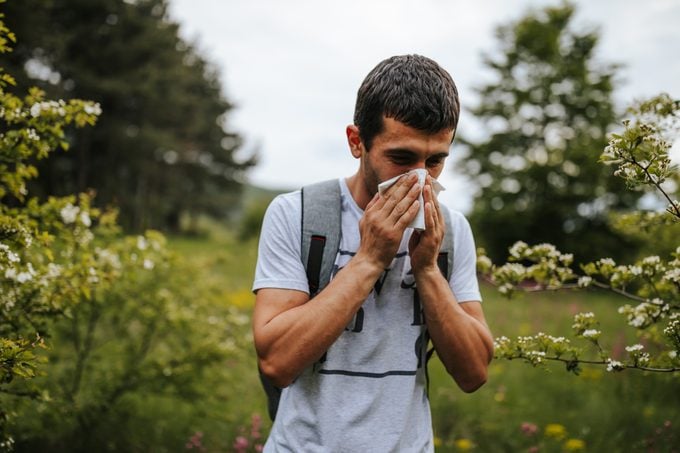What Is an Allergen? How These Particles Cause Allergic Reactions
Updated: Jul. 06, 2021
Allergens are substances that set off an allergic reaction. Learn what they are, how your body reacts, and how to manage symptoms.
On This Page
What are allergens?
Nearly everyone experiences an allergic reaction at some point in their life, whether it is in response to a bug bite, a specific food, or pollen.
“Allergies are the general term that we use to refer to the immune system’s response to things that we encounter and set off our allergy cells,” explains allergist Ryan Steele, DO, an assistant professor at Yale School of Medicine in New Haven, Connecticut.
Symptoms can range in severity, from getting hives when we take an antibiotic or experiencing nasal congestion and itchy eyes after petting a dog to a serious reaction to a bee sting.
An allergen is a substance—a food, medication, or something in the environment, for instance—that sets off an allergic reaction.
Dr. Steele explains that an allergen is simply something that your immune system encounters and overreacts to. Instead of ignoring or tolerating the allergen, your immune system sets off an allergic response.
Why do allergens trigger a reaction?
Dr. Steele reveals that allergies are really more than just one entity irritating your immune system into responding. There are multiple reasons allergies trigger a reaction, encompassing a range of immunologic reactions.
But a key feature of allergic reactions is that they generally occur in response to something that your immune system has encountered before.
“Either a medication you had before or a product you used or a food you ate usually primes your immune system to have an allergic reaction the next time you encounter it during a process called sensitization,” he says.
The most common allergies are to foods or medications.
“These are termed immediate hypersensitivity reactions and often are caused by a specific type of allergic antibody called IgE [immunoglobulin E] that recognizes allergens and sets off our allergy cells to release a number of mediators, including histamine, which gives us symptoms such as itchiness,” Dr. Steele explains.
There are also delayed hypersensitivity reactions that can cause a host of reactions, he adds.
These include drug rashes that appear even after discontinuing medication, inflammation in our esophagus from eating certain foods, or rashes from personal care products.
What’s happening in the body when it’s exposed to an allergen?
Dr. Steele explains that when the body is introduced to an allergen, it provokes an allergic reaction.
Remember, your immune system spies the allergen, thinks “invader!” and mounts an attack. It releases histamine, which causes the allergic reaction you’re so familiar with.
The response is dependent on a number of factors, including where it is encountering the allergen.
“If an environmental allergen is encountered on our skin, for instance, you may get a rash or a hive,” he points out. “But if you have asthma and breathe in an environmental allergen then it may cause an asthma attack.”
The chemicals released during an allergic reaction may include ones that are already formed. They sit in little granules in allergy cells and immediately get released upon allergen exposure. But in some cases, the allergens may take hours or days to call specific immune cells to a site of contact.

Range of symptoms an allergen can trigger
The symptoms can vary greatly when you are exposed to an allergen, explains Dr. Steele.
An allergic reaction encompasses everything from mild and transient symptoms all the way to anaphylaxis, a potentially life threatening reaction. These type of reactions require emergency medical attention and treatment, usually with epinephrine (the medication found in an EpiPen).
Symptoms of a mild allergic reaction can include:
Additional symptoms of a moderate to severe reaction include:
- Abdominal pain
- Abnormal (high-pitched) breathing sounds
- Anxiety
- Chest discomfort or tightness
- Cough
- Diarrhea
- Difficulty breathing
- Wheezing
- Difficulty swallowing
- Dizziness or light-headedness
- Flushing or redness of the face
- Nausea or vomiting
- Palpitations
- Swelling of the face, eyes, or tongue
- Unconsciousness
Types of allergens
Allergens take on many forms and can be ingested, inhaled, or in contact with skin, Dr. Steele explains.
The most common allergens are:
- Animal proteins and animal dander
- Dust mites
- Drugs (such as antibiotics or medicines you put on your skin)
- Foods (such as eggs, peanuts, milk, nuts, soy, fish, animal meat, and wheat)
- Fungal spores
- Insect and mite feces, insect bites, and insect stings (their venom)
- Natural rubber latex
- Pollen
“Typically, allergens are proteins that are large enough to elicit an immune response, and with each exposure they fairly reliably induce an allergic response,” adds Dr. Steele.
Sometimes allergens that are not typical protein allergens or are too small to be recognized by the immune system on their own need to break down into proteins in our own body or be metabolized by our liver before the immune system can recognize them, he explains.
Who is susceptible and why?
The tendency to develop allergic responses is termed “atopy.”
“There are genetic and environmental considerations that go into forming allergic reactions,” Dr. Steele explains.
People who have diseases such as eczema or asthma are more prone to allergies. Allergic reactions occur more often in people who have a family history of allergies.
“A few key features of making an allergic response include having a prior exposure, sometimes repeated,” Dr. Steele explains. “It is not unusual to form an allergic response to foods or medications tolerated multiple times in the past.”
Where can you find allergens?
Allergens can be found everywhere, both inside of your house and outdoors.
Dr. Steele notes that when it comes to food, the ingredients with the greatest potential to cause an anaphylactic reaction, such as nuts and shellfish, are typically labeled on products.
How to prevent an allergic reaction
The best way to prevent or manage allergic reactions is to see an allergist, who can help you identify your triggers by doing an allergy test and can come up with a treatment or avoidance plan should you encounter these allergens again, explains Dr. Steele.
That’s especially important if you have a respiratory condition like asthma, which may be triggered by allergies.
Once the source of your allergies is identified, your allergist will provide specific ways to avoid the allergen and manage your symptoms.
Here are some general tips to prevent and better manage your symptoms:
- Avoid allergens
- Remove allergens from your home with an air purifier
- Take your medicine for managing allergens
- Carry an Epi-Pen with you if you’re at risk for anaphylaxis
- Wear a medical alert bracelet or necklace if you’re prone to experiencing severe allergic reaction
- Track your symptoms to identify allergy triggers
- Follow your allergist’s plan
If you’re struggling to get your allergies under control, your doctor may suggest allergy shots, a type of immunotherapy that gradually introduces your immune system to an allergen with the goal of long-term relief.



